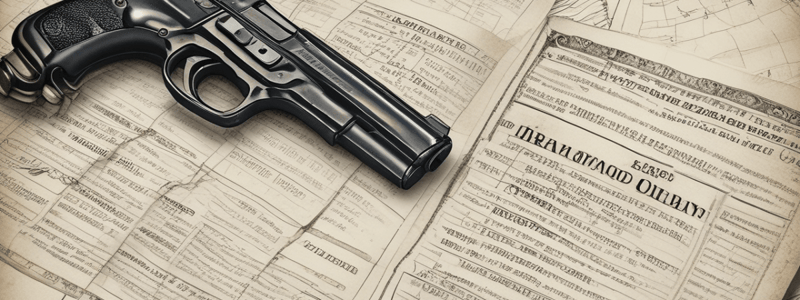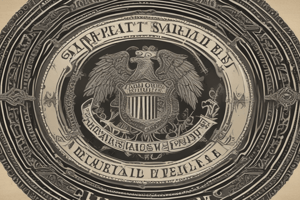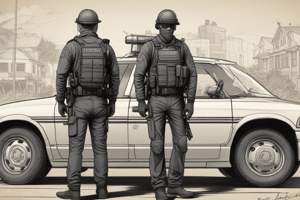Podcast
Questions and Answers
What is a necessary condition for seizing evidence during a search warrant execution?
What is a necessary condition for seizing evidence during a search warrant execution?
- The evidence is hidden in a secret compartment
- The evidence is in plain view or is immediately recognizable as contraband (correct)
- The supervisor/commander of the investigative element gives oral permission
- The evidence is only related to a crime committed 10 years ago
When executing a search warrant, who should be contacted if evidence related to a crime not normally investigated by the serving personnel is found?
When executing a search warrant, who should be contacted if evidence related to a crime not normally investigated by the serving personnel is found?
- The supervisor/commander of the appropriate investigative element (correct)
- The local district attorney
- The chief of police
- The supervisor/commander of the serving personnel's element
What should non-uniformed investigative sworn/non-sworn members do during the execution of a search warrant?
What should non-uniformed investigative sworn/non-sworn members do during the execution of a search warrant?
- Display their identification cards and/or badges only when asked
- Wear police identification cards and/or badges in plain view (correct)
- Leave their identification cards and/or badges in their vehicles
- Wear civilian clothing to blend in with the surroundings
What is the purpose of the Exclusionary Rule?
What is the purpose of the Exclusionary Rule?
What should happen to the area before investigative sworn members enter?
What should happen to the area before investigative sworn members enter?
What should be left with the person in charge of the premise or in plain view at the site of the search?
What should be left with the person in charge of the premise or in plain view at the site of the search?
What should investigative sworn/non-sworn members do upon arriving at the scene?
What should investigative sworn/non-sworn members do upon arriving at the scene?
Before relinquishing custody of the scene, what should investigative/entry personnel members ensure?
Before relinquishing custody of the scene, what should investigative/entry personnel members ensure?
Before obtaining a 'No-Knock' entry warrant, what is the requirement for the Department member applying for the warrant?
Before obtaining a 'No-Knock' entry warrant, what is the requirement for the Department member applying for the warrant?
What is the justification for detaining occupants of a premise during the execution of a search warrant?
What is the justification for detaining occupants of a premise during the execution of a search warrant?
What is the procedure after gaining entry during a search warrant execution?
What is the procedure after gaining entry during a search warrant execution?
Under what circumstances can a judge authorize a 'No-Knock' entry at the time the warrant is issued?
Under what circumstances can a judge authorize a 'No-Knock' entry at the time the warrant is issued?
What happens to subjects located or encountered during the execution of a search warrant?
What happens to subjects located or encountered during the execution of a search warrant?
When can entry personnel dispense with the 'Knock and Announce' requirement?
When can entry personnel dispense with the 'Knock and Announce' requirement?
What is the requirement for seizing evidence or contraband found during a search warrant execution?
What is the requirement for seizing evidence or contraband found during a search warrant execution?
What is the requirement for entry personnel regarding questions to detained subjects during a search warrant execution?
What is the requirement for entry personnel regarding questions to detained subjects during a search warrant execution?
What is the primary purpose of conducting searches in a reasonable manner?
What is the primary purpose of conducting searches in a reasonable manner?
When is it permissible to conduct a search warrant at night?
When is it permissible to conduct a search warrant at night?
What is the exception to the knock and announce rule?
What is the exception to the knock and announce rule?
What should be included in a report involving a forced entry or search warrant entry?
What should be included in a report involving a forced entry or search warrant entry?
What is the purpose of a protective sweep during a search?
What is the purpose of a protective sweep during a search?
What is the rule regarding the destruction of evidence during a search?
What is the rule regarding the destruction of evidence during a search?
What is the purpose of announcing police presence during a protective sweep?
What is the purpose of announcing police presence during a protective sweep?
When can a no-knock warrant procedure be used?
When can a no-knock warrant procedure be used?
Flashcards are hidden until you start studying
Study Notes
Searches and Seizures
- Searches and seizures must comply with federal and state legal requirements to ensure admissibility of evidence in court.
- Searches conducted with a warrant may be done at night if daytime is not practicable.
Exceptions to Time Guidelines
- Exceptions to the time guideline include:
- Circumstances that can be articulated, such as officer safety, urgency of investigation, or probability of evidence removal or destruction.
- Occupants sleeping during the execution of the warrant.
- Urgency of the investigation.
- Probability that evidence will be removed or destroyed.
Knock and Announce
- The U.S. Supreme Court ruled that search warrant and arrest warrant entries must be preceded by a knock and announcement.
- No "blanket exceptions" to the rule exist.
- Entry personnel must announce police presence when changing levels of a structure during a protective sweep, unless an exception can be articulated.
- Exceptions to the knock and announce rule include:
- Circumstances that present a threat of physical violence.
- When a prisoner escapes and retreats to their dwelling.
- Reasonable belief that evidence is being or may be destroyed.
Forced Entry Reports
- Reports involving forced entry or search warrant entry must indicate that entry personnel knocked and announced prior to entry.
- The report should indicate approximately how long entry personnel waited before forcing entry.
Search Warrant Execution
- The property is either in plain view from a location where the investigative/entry personnel has a legal right to be, or in a place where the investigative/tactical sworn member(s) may reasonably search for the items listed in the search warrant.
- Items that are immediately recognizable as contraband, such as illegal weapons or illicit drugs, may be seized.
- When executing a search warrant, be aware of the "Exclusionary Rule" which states that any evidence secured by illegal means and in bad faith cannot be introduced in a criminal trial.
Search Warrant Procedure
- Upon rendering the area safe, entry personnel will notify investigative sworn members that they may enter and conduct their investigation.
- Investigative sworn/non-sworn members will not enter the area until so notified.
- Police identification cards and/or badges will be worn and displayed in plain view by all non-uniformed investigative sworn/non-sworn members during the execution of a search warrant.
- A copy of the search warrant, return/receipt for search warrant, and if applicable, the return/receipt for search warrant supplemental will be left with the person in charge of the premise or in plain view at the site of the search.
No-Knock Warrants
- Prior to obtaining a judge's authorization for a "No-Knock" entry warrant, the Department member applying for the "No-Knock" warrant must get approval from their Bureau Commander or higher.
- When a warrant application establishes that some exigent circumstance exists or that knocking would be futile, a judge may authorize a "No-Knock" entry at the time the warrant is issued.
Studying That Suits You
Use AI to generate personalized quizzes and flashcards to suit your learning preferences.



